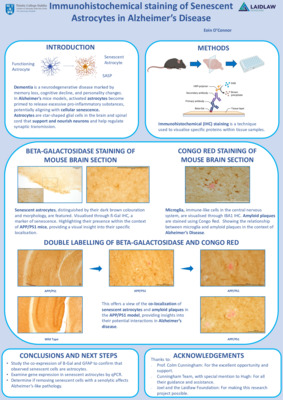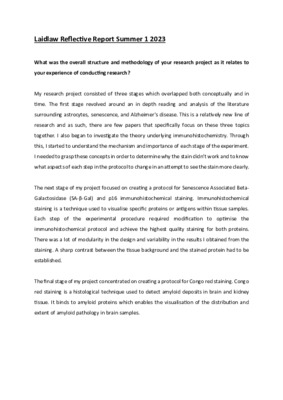Laidlaw Undergraduate Leadership and Research Programme
Application – 2023 Cohort
|
Name |
Eoin O’Connor |
|
Programme |
Biological and Biomedical Sciences |
|
Year of Study |
2nd Year |
|
Research Project Title |
Studying Changes in Astrocyte Phenotypes in Disease Pathology |
|
Proposed Supervisor |
Dr. Colm Cunningham, Associate Professor Neuroscience, TCD |
|
Research Project Proposal |
|||||
|
Introduction |
|||||
|
Dementia is a debilitating neurodegenerative disorder characterised by progressive loss of memory, changes in personality and cognitive impairment. Despite significant progress in understanding the underlying causes of dementia, effective treatments remain elusive. As life-expectancy is increasing rapidly, from 77.7 years for people born in 2002 to 81.3 years for people born in 2019, the need for a cure is becoming even more pertinent. Alzheimer Europe estimates that the number of people with dementia will double by 2050. It has emerged recently that inflammation occurring outside the brain can exacerbate inflammation and damage events inside the brain. This means that insults such as infections, surgeries or injuries can accelerate the process of dementia as well as producing profound acute (sudden) changes in cognition such as delirium. Delirium is a highly prevalent acute neuropsychiatric syndrome occurring in more than 20% of the general hospital population but it is especially prevalent in patients with existing dementia at the time of experiencing these injuries. The last decade has seen increasing interest in the role of astrocytes, a type of glial (non- neuronal) cell in the brain, in the progression of neurodegenerative diseases like Alzheimer's disease. Astrocytes are an integral part of the brain, and together with microglial cells, they contribute to immune responses in the brain (‘neuroimmune’ or ‘neuroinflammation’). Astrocytes also contribute to the regulation of neuronal electrical activity, brain blood-flow, cognition and behaviour. Astrocytes can gain or lose functions when they become activated. Recent studies in the lab of Professor Cunningham have shown that in mice that have been genetically modified to mimic key aspects of Alzheimer’s disease, astrocytes are not only ‘activated’ by disease (through induced genetic change) but they become ‘primed’ (or hypersensitive) to release excessive levels of pro-inflammatory mediators when experiencing a second stimulus such as an infection. However, this sequence of events also conforms to some definitions of what has been termed ‘cellular senescence’, a biological process in which a cell loses the ability to divide and multiply further. This occurs due to damage to cellular components and contributes to significant loss of functions that could be extremely detrimental to the nerve cells that cognitive function relies upon. Understanding the overlap between primed and senescent astrocytes is now an important question to address and highlights a possible new shift towards senescence research when the sudden inflammatory insult, outside the brain, influences the activation status of the astrocyte. In this study, acute infection will be used to mimic the condition of delirium. I will use brain slices from an Alzheimer’s mouse model, and apply the techniques of immunohistochemistry and PCR methodology to characterise how astrocytes change their activation state in response to acute infection in the healthy brain and in the presence of Alzheimer's type pathology. The findings could contribute significantly to our understanding of inflammatory changes underpinning brain dysfunction in dementia and delirium. I will characterise how the astrocyte changes its activation state as it passes through non-diseased and diseased states and also when acute events outside the brain triggers these cells to switch their function in a reversible or irreversible way when exposed to inflammation outside the brain. |
|||||
|
Project Methodology & Timeline |
|||||
|
The first weeks of the project will consist of studying changes in astrocyte activation and function will be assessed by examining neuropathology (pathology, injury and cell death in the brain). A method called immunohistochemistry will be used to study the changes in astrocyte function in the brain. Antibodies will be directly applied onto the brain slices, and then tagged with fluorescent or coloured tags. The brain sections will be viewed under the microscope. I will look for changes in markers of activation in the astrocytes in the brain sections. I will also look for changes in astrocyte activation status by investigating a range of genes expressed by astrocytes that have been isolated from these brains. A method called PCR (Polymerase Chain Reaction) will be used to analyse small changes in gene expression. Together, the immunohistochemistry and PCR approaches will be used to study changes in astrocyte function during the primary disease process, and also immediately after secondary inflammatory "insults" occurring outside the brain, such as infection. In the later weeks of the project data emerging from both techniques will be integrated to illustrate changes in astrocyte phenotypes during ongoing disease and during acute exacerbations caused by infection (delirium-like changes). Translation to Human Studies: There is an opportunity to extend some of the findings from mouse work into human samples. Although this part is unlikely to be achieved in 6 weeks, that research pipeline can be extended and may be open if I wish to stay on in the lab during the remainder or the Summer and/or during the remaining period of the Laidlaw Scholarship. These analyses would exploit analysis of human cerebrospinal fluid (CSF), to determine if the findings in the mouse can be validated in human samples from humans with dementia and those who were experiencing delirium at the time of sampling, after being admitted to hospital with hip-fracture. |
|||||
|
Intended Outcomes |
|||||
|
The results of this study will contribute to our understanding of the changes in astrocyte function in the progression of neurodegenerative diseases like Alzheimer's and in the acute changes that happen . We hope to identify new markers of disease progression, and to uncover new avenues for treatment development. In particular, we hope to gain insight into the role of senescent astrocytes in neuroinflammation and neurodegenerative disease progression. This research proposal represents a comprehensive approach to studying the changes in astrocyte function in the progression of neurodegenerative diseases like Alzheimer's. The combination of mouse tissue models and astrocytes isolated from these, as well as the possibility for extension into human studies will provide a translational insight into the changes in astrocyte function during neurodegenerative disease progression and how this is altered, perhaps irreversibly by inflammatory events happening outside the brain.
|
|||||
|
Planning for pre-approval requirements ( if relevant e.g. ethics approval, Garda vetting) |
|||||
|
Planning for expected additional project costs (if relevant e.g. lab expenses, subscriptions, software, project-related travel) |
|||||
|
Are there any other relevant details to your proposal e.g., interdisciplinary collaborations, potential for international travel, or links to existing projects or organisations? |
|||||
|
Leadership-in-Action experience proposal |
|||||
|
LiA Category |
Category A: Central Laidlaw Foundation Project |
x |
|||
|
Category B: Leadership Placement |
|
||||
|
Category C: In-field application of research |
|
||||
|
|||||
|
Are there any other relevant details to your proposal e.g., interdisciplinary collaborations, potential for international travel, or links to existing projects or organisations, plans to apply to a Study Abroad / Erasmus opportunity? |
|||||
|
|
|||||





Please sign in
If you are a registered user on Laidlaw Scholars Network, please sign in